There Is Power in Sponsor Letters … in Your Letters
At some point, everyone feels like God has left them. Yunita, one of the youngest translators for Compassion Indonesia, felt as though she had been abandoned by God until she read the words of a sponsor.
Continue Reading ›Extreme Makeover: Heart Edition
I am a sucker for reality TV. Seriously, if someone is weighing himself or trying to win a quick-fire cooking challenge or ripping down a house on TV, I’m there.
But I’ve got to tell you, working at Compassion spoils you for pop culture. Suddenly everything is in perspective.
Before starting my job here, I used to love Extreme Home Makeover. I loved seeing the crazy kitchens, the creative design and the happy people. I would cry with them when they yelled with Ty, “Bus driver, move that bus!” And I still do love the heart of helping and generosity it is spreading.
But since being daily faced with the realities of the majority world, I can’t help but be distressed by our sometimes-trend toward bigger is better and more is more attitude. We seem to be in a never-ending game of one-upmanship.
I don’t personally think there’s anything inherently wrong or sinful about a big house. What is dangerous is the subtle message we are ingesting that if our homes aren’t big, if they aren’t new, if they aren’t decked with the trendiest design, it’s a reason to shake our heads shamefully. We can begin to look around at what we have and think, “This isn’t that great” when we compare it to the over-the-top luxury we see.
It’s sad. We have so much! Think of Joshua’s home in Indonesia. (more…)
Continue Reading ›Vallarasu the Outlier
NOTE FROM EDITOR: This content honors Compassion’s historical work in India. While we no longer have an India sponsorship program, we are grateful for the lives changed and meaningful work achieved through our sponsors and donors in our nearly 50 years there. For a detailed explanation of the end of our sponsorship program in India, please visit: compassion.com/india-update.
Outliers are men and women who do things out of the ordinary; men and women who have drive, skill and talent, but who also are given an opportunity to succeed.
“When outliers become outliers it is not just because of their own efforts. It’s because of the contributions of lots of different people and lots of different circumstances.” – Malcolm Gladwell
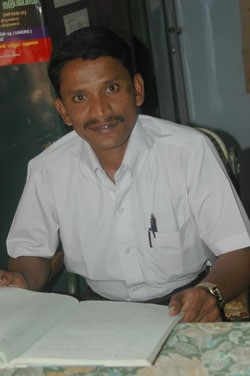 Vallarasu is an outlier.
Vallarasu is an outlier.
Vallarasu hails from Srivalliputhur. He is now 30 years old. Though his physique suggests that he is very soft guy, his words are weighty and powerful. There is a passionate boldness in his face.
Vallarasu’s dad was a shopkeeper and sold household goods. When Vallarasu was 6 years old, his father was murdered by a gang. Thereafter, the family suffered greatly. They had no money to afford even one square meal a day.
One year after the murder, Vallarasu’s mother committed suicide, and Vallarasu and his two sisters were left orphans. His two sisters were brought up by an uncle, but Vallarasu was left behind in the streets.
Compassion found him in the streets, and he was taken into St. Andrews Child Development Center. The center supported him so he could study in the school. The school had a hostel facility, so the center provided him with not only education, but also gave him shelter, food and comfort.
The problems that Vallarasu experienced as a little child instilled a deep burden within his heart. He developed a burning desire to help orphans and desolate children. He took the initiative in solving every little conflict that arose among the children at St. Andrews, and even teachers marveled at his efficiency.
Some teachers commented, “In the future, you will become a big leader in the society.” While others said, “I am sure you will stand as an advocate speaking for thousands in days to come.”
Seven Were Chosen to Serve the Needy
Compassion, which reopened its East Indonesia ministry in 2005, has brought new life to the ministry of some churches. Pastor Pangkey is one pastor who has been inspired by Compassion to begin new patterns of ministry.
He had the opportunity to take part in the Global Leadership Summit in 2007 in Jakarta. At the meeting, God asked him to challenge his congregation to open its heart more for the people in the community.
Pastor Pangkey felt that God wanted him to look to the others who haven’t yet been reached by our programs and the church. This is how he began the Stefanus Group.
“God spoke to me through the scripture in Acts 6:1-7, which speaks about the seven chosen men. The Twelve Disciples chose Stephen and six other men to be responsible for what the people needed at that time.
“We know that people who live in poverty are not only people in the past. We still meet a lot of people who live in poverty today. They can’t afford their basic needs like meals because many of them don’t have opportunity to have a job or build their own business. They have to struggle every day to fulfill their basic needs.”
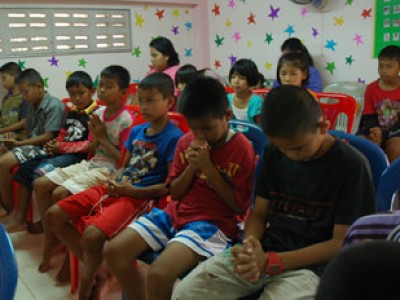
Bringing Christ to Buddhist Villagers
Mai-treejit Sawang-dandin church is located in Sakon Nakorn, a region in northeastern Thailand. It is commonly known as the barren region. Numerous people of all working ages move here to work in the big city, where they can earn a decent income to support themselves and their families.
Noppadol and Ladda Surin were a young couple who had just graduated from Bible school and had come to serve God in this area. The first time they held a Sunday service at Mai-treejit Sawang-dandin church, there were only five members in the congregation.
As they walked away from the church grounds after the service, they could see the large Buddhist temples that surrounded the community and the church. They silently prayed,
“What can we do to bring salvation to the people in this community?”
“The villagers considered Christianity a western religion, and building in-depth relationships with them was initially very difficult. Another major concern was that the villagers were strong Buddhists, and there were temples existing in every village,” explains Pastor Noppadol.
About 98 percent of the communities in Sakon Nakorn are Buddhist. Every morning it is common to see villagers waiting along the road in front of their houses to make merit by putting food into the bowls of Buddhist priests as they collect their alms for the day.
In every Buddhist ceremony, the community gathers together to celebrate for the entire day, much in the same way holidays such as Christmas are celebrated in western cultures. Everyone in the community participates in helping and preparing for the ceremony weeks in advance. The community’s collective effort ensures the ceremony is a success.
In this environment, the church needed some help to reach out to the poor and bring glory to God. Compassion provided the solution. (more…)
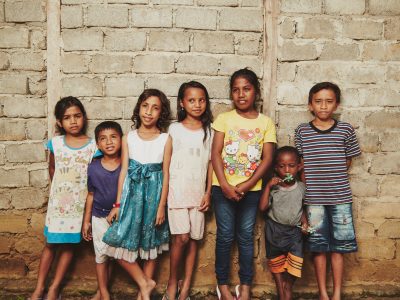
Protecting the Children in Our Program
In Indonesia, children’s rights are a critical issue — as in many countries, women and children are often the most vulnerable members of the community. Compassion Indonesia understands the urgent need to address this issue that often remains silent.
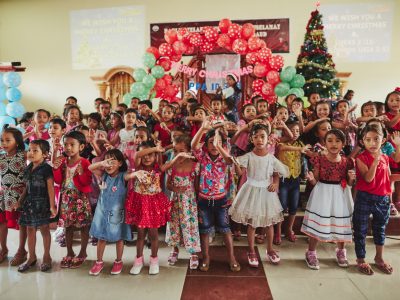
Christmas in Indonesia
One might think that celebrating Christmas in Indonesia – the world’s most populous Muslim nation – can be a problem. Even though 90 percent of Indonesia’s 220 million people are followers of Islam, it does not mean that Christmas is not celebrated.
The biggest signs of Christmas (i.e. the traditions of the Western festive season), can be seen in the malls. Most of the major stores in the larger cities like Bandung have huge Christmas trees, and restaurants tend to put on some manner of Christmas fares.
For example, the big stores have had their Christmas decorations up for weeks in anticipation of cashing in on the season. Naturally, hotels and malls cater to visitors by erecting Christmas trees ornately decorated, and “Merry Christmas” signs. Shopping hours are extended, and the seasonal specials jump out of nowhere.
There is a Christmas tree in every mall, and a man dressed in a Santa Claus suit and a white beard can be seen giving out presents to the children. It is the same in the other cities like Jakarta, where all the major department stores join in on the festive season.
One of Compassion’s partner churches in Bandung is Immanuel Baptist Church. Christmas decorations have been in place since the first week of December. A plastic Christmas tree stands by the front entrance door to welcome all the visitors; its snow-like glitter and many small butterflies on the leaves delight the small children.
Yes, the church entrance had been decorated with an artificial Christmas trees replete with pristine snow-like glittery ornaments and small butterflies – standing unaffected by the boiling tropical heat. (more…)
Angelica’s Father Is Missing
Angelica’s father is missing. The last time he’d gone astray, he was found after a few weeks, but now it’s been months. Angelica’s mother explains that her husband is mentally ill. He used to work on the farm, strong as a water buffalo.
“He just went home one day afraid of dying,” says Emma, Angelica’s mother. “After that, he kept on saying ‘they are going to kill me’ over and over until he lost all sense of reality.”
Since then, Emma took on the responsibility of raising their four children. Angelica, 6, is the youngest. Emma worked hard day and night as a house-help, earning only $25 a month, until she developed a heart ailment. (more…)
A Clean Drinking Water Lesson
The availability of clean water can be taken for granted in developed countries such as the U.S. or U.K. For people in Bangladesh, however, clean water can be scarce.
In many remote places in Bangladesh, people may never drink clean water. They suffer from waterborne diseases, which are adopted into their lives as normal.
Flying over Bangladesh, you see hundreds of rivers and canals covering the country. But most of these water sources are badly polluted and not safe for drinking or other uses.
So not only is it difficult to provide food for everybody in this impoverished country, it is even more difficult to ensure safe drinking water for the people of Bangladesh.
Haydarnashi Child Sponsorship Program has had a problem finding clean water from the very beginning. The cook had to carry drinking water for 142 children every day. He also had to carry the water for daily cooking. (more…)
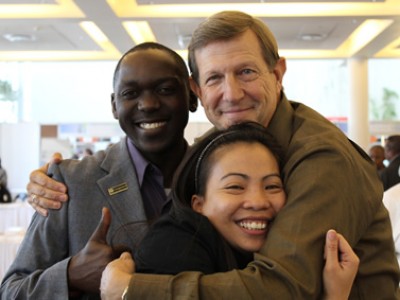
Letter Writing Ideas From the Moody Bible Institute Scholars
Four Leadership Development Program graduates now attending Moody Bible Institute share some tips on what you should include in the letters you write to your sponsored children.
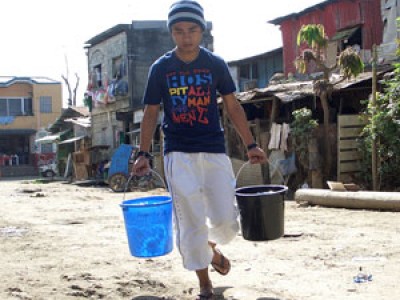
Christian Servant Leadership in Action
Every year, graduating Leadership Development Program (LDP) students in the Philippines go to work camp where they engage in community service. The yearly work camp usually engages students in missionary work to unreached tribal groups, but this year the students extended a helping hand to typhoon victims.
Was My Sponsored Child Affected by That Crisis?
In a perfect world, here’s how the process would work:

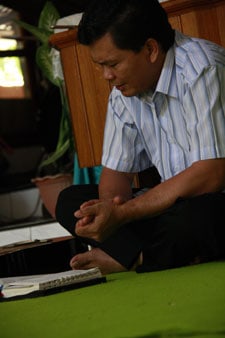 “God spoke to me through the scripture in Acts 6:1-7, which speaks about the seven chosen men. The Twelve Disciples chose Stephen and six other men to be responsible for what the people needed at that time.
“God spoke to me through the scripture in Acts 6:1-7, which speaks about the seven chosen men. The Twelve Disciples chose Stephen and six other men to be responsible for what the people needed at that time.
